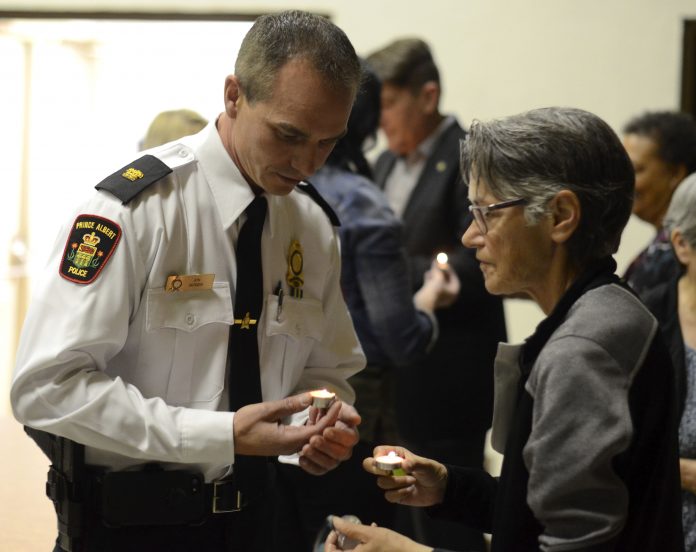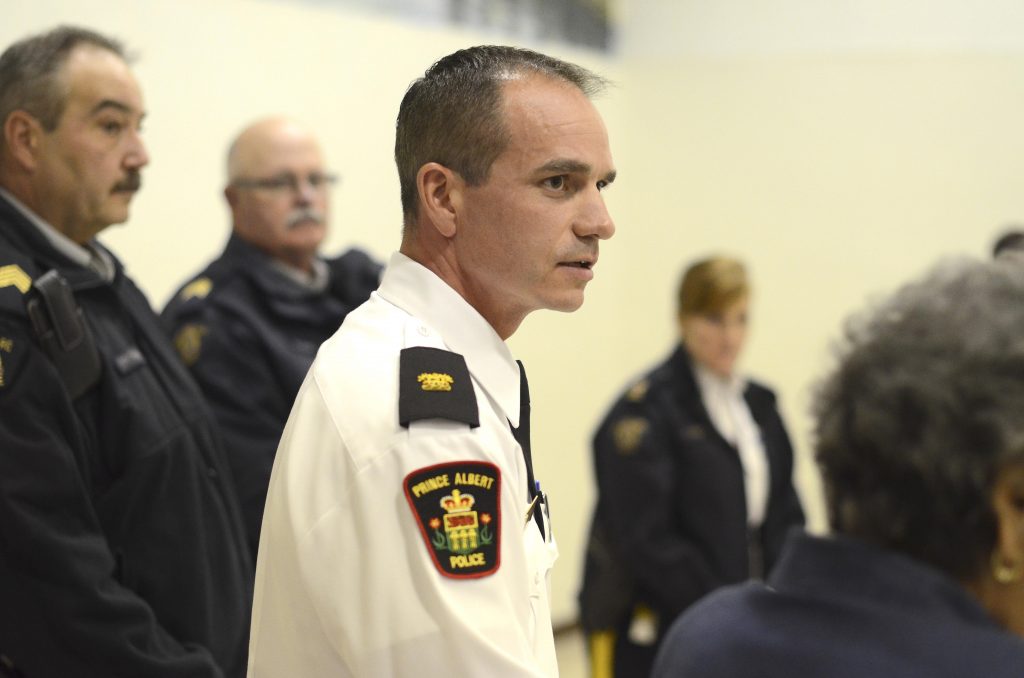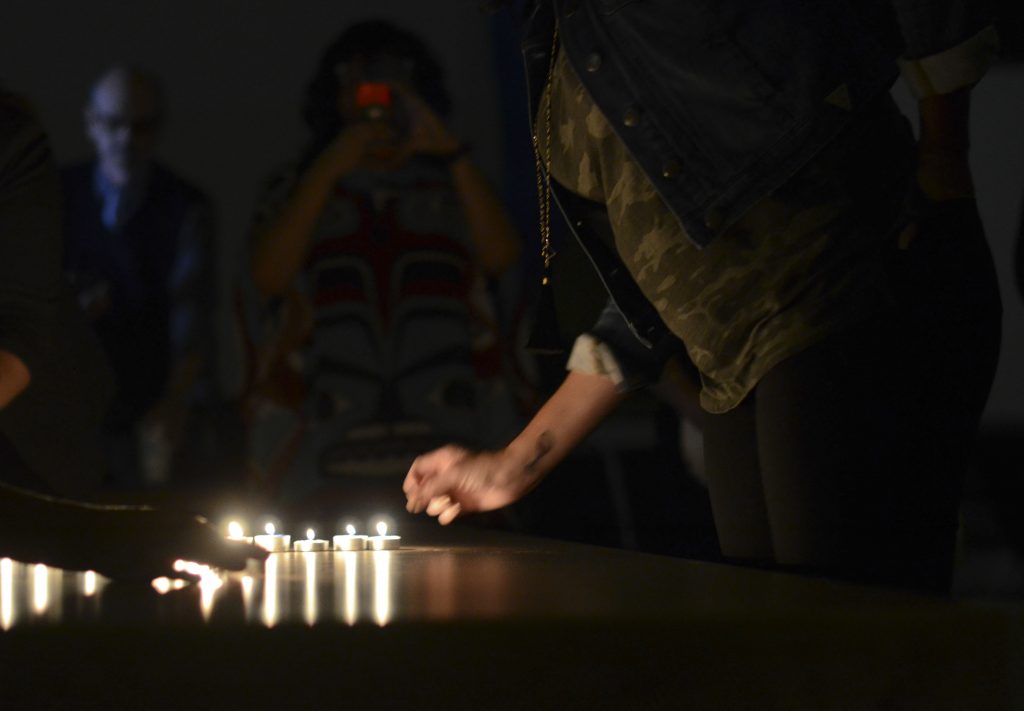
Vigil a chance to reflect on community impact, successes, failures and the path forward
Police officers, community leaders, politicians and concerned members of the community gathered together Wednesday to remember Saskatchewan’s missing and murdered Indigenous women and girls (MMIWG).
The October 4 vigil was one of dozens held across Canada. The number of vigils has grown from 11 in 2006 to 216 in 2014.
Members and leadership from the RCMP, Prince Albert Police, City Council, Police Indigenous Women’s Advisory Council, Prince Albert Indian Métis Friendship Centre, Prince Albert Grand Council and Metis Nation Saskatchewan joined with concerned citizens for a sharing circle, speeches and a candle light vigil inside the friendship centre during the noon hour.
A key theme emerged from the event – everyone is affected when an Indigenous woman goes missing or is killed.
“Missing persons touches us all,” said RCMP Insp. Roberta McKale, operations officer of the north district.
“I’ve investigated missing persons. These instigations take a toll on everybody, including the communities, families, investigators and search and rescue. We have people who are constantly in the back of their minds thinking about these investigations, and the Sisters in Spirit vigil is an opportunity to come together and keep that momentum and support going. It’s very important to me that I see this continue.”
McKale wasn’t the only police officer who spoke passionately about the need to keep pushing the cause of missing and murdered Indigenous women.
The Prince Albert Police Service had some members of its leadership team present. While Chief Troy Cooper wasn’t available, Inspectors Jon Bergen and Jason Stonechild, as well as cold case and missing persons investigator Sgt. Ryan Levesque, stood shoulder to shoulder with other attendees.
“When there’s a missing person, there’s never enough we can do until that person is found,” Bergen said.

“We don’t close these cases. I can’t imagine what the family experiences, because they can’t shut it off.”
For the Prince Albert Police, the importance of dealing with this issue starts at the top.
“It’s a community issue, and the police are a big part of this community,” Said public liaison officer Sgt. Travis Willie, who was also in attendance.
“This is very important to Chief Cooper and our police service. We need to be involved, and we want to be involved and work with the families and friends.”
Organizers, who included Insp. McKale and local volunteer Sheryl Kimbley, were pleased with the turnout, but hope to increase the number of participants in future years.
“This is something we all really wanted to get behind,” Kimbley said. This is something we want to do in a very big way next year. In Prince Albert, it hits us very close to home. We are still searching for so many of our loved ones.”
While Oct. 4 was recognized nationally as a day to remember those who are missing and murdered, this week also marks the six-month anniversary of the disappearance of Happy Charles.
Cases like that of Charles help illustrate how the whole community is affected when someone goes missing.
“I don’t think there is anybody who isn’t touched when somebody goes missing,” said Prince Albert YWCA CEO Donna Brooks.
“I know our employees at the YWCA work with the women and work with their families. For example, Happy Charles was a client of ours. Every time a client goes missing, or passes away or is murdered, it takes a piece of our staff.”
Once the speeches and reflections were over, the attendees lit candles and placed them on a table in the centre of the room in the shape of a cross.

The gesture was an act of remembrance of those missing or murdered and their families. But the event was about a lot more than just acknowledging the impact of MMIWG. It was also about acknowledging shortcomings, celebrating successes and building for the future.
As of Wednesday, the RCMP is handling 35 open cases of missing or murdered women and girls from northern Saskatchewan. That’s an increase over last year. The Prince Albert police have also seen a rise in the number of cases.
“We don’t read out the names of out of respect for the people who are missing,” McKale said. “There is a website that lists them, and it is the saddest thing. Our goal is to have it at zero.”
Still, those who have dealt with the issue of MMIWG since a time before it attracted national media attention are pleased with how far society has come.
Julie Pitzel is the former Aboriginal resource officer with the Prince Albert police. She was on hand as the designated elder at the vigil, offering prayers and comments about how far society has come.
“I’m really glad for the way people in this country, our province and our community of Prince Albert have brought this issue up so it’s highlighted,” she said. “We have more communication to support families,. We have people giving tips to (police). The awareness is there. The way we handle the cases has improved.”
But Pitzel also said there is still lots of work to be done.
“What’s missing is having respect. It’s all based on respect for other people. That’s why we have vigils like this.”
Friendship centre executive director Janet Carriere said the only way to tackle the problem is as a community.
“When we talk about family, we usually talk about the biological family, but we forget the family of friends. At the friendship centre, we have people who come to our doors everyday, and they are indeed family. When someone goes missing or is murdered, I think a lot of people have written them off. They’ are people doing the best they can,” she said.
“As a community, we have to come together to support them. If we do that, maybe we’ll be helping with some of the addictions and problems in our community and making it a healthier environment.
If we come together as a community, as a family, we can make it a better place to live every single day.”

